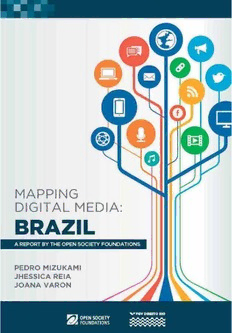Table Of ContentMapping digital media: Brazil
A report by the Open Society Foundations
Praia de Botafogo, 190 | 13rd fl oor
Rio de Janeiro | RJ | Brazil | ZIP code: 22250-900
55 (21) 3799-5445
www.fgv.br/direitorio
Mapping digital media: Brazil
A report by the Open Society Foundations
Pedro Mizukami
Jhessica Reia
Joana Varon
FGV’s Rio de Janeiro Law School Edition
This Work is licensed under the Creative Commons license
Attribution — Non Commercial — No Derivs 3.0
Printed in Brazil
This fi rst edition was completed in August 2014
This book is in the Legal Deposit Division of the Brazilian National Library.
Authors are responsible for all concepts and information presented in this book.
Coordination: Sacha Mofreita Leite, Thaís Teixeira Mesquita e Rodrigo Vianna
Cover: FGV’s Rio de Janeiro Law School
Diagramation: Leandro Collares — Selênia Serviços
Catalographic card prepared by
Mario Henrique Simonsen Library / FGV
Mizukami, Pedro Nicoletti
Mapping digital media Brazil: a report by the Open So-
cieties Foundations / written by Pedro Mizukami, Jhessica
Reia and Joana Varon; edited by Marius Dragomir, Mark
Thompson, Fernando Bermejo. — Rio de Janeiro: Escola de
Direito do Rio de Janeiro da Fundação Getulio Vargas, Cen-
tro de Tecnologia e Sociedade, 2014.
340 p. : il.
ISBN: 978-85-63265-33-3
1. Mídia digital — Brasil. 2. Comunicação de massa —
Brasil. I. Reia, Jhessica. II. Ferraz, Joana Varon. III. Dragomir,
Marius. IV. Thompson, Mark. V. Bermejo, Fernando. VI. Es-
cola de Direito do Rio de Janeiro da Fundação Getulio Var-
gas. Centro de Tecnologia e Sociedade. VII. Título.
CDD – 302.231
This book was produced by FGV’s Rio de Janeiro Law School,
composed with the Gotham typeface
and printed on offset paper by Singular printer
in 2014.
Mapping digital media: Brazil
A report by the Open Society Foundations
EDITED BY
Marius Dragomir and Mark Thompson (Open Society Media Program editors)
Fernando Bermejo (regional editor)
EDITORIAL COMMISSION
Yuen-Ying Chan, Christian S. Nissen, Dušan Reljic’, Russell Southwood,
Damian Tambini
The Editorial Commission is an advisory body. Its members are not responsible
for the information or assessments contained in the Mapping Digital Media texts.
OPEN SOCIETY MEDIA PROGRAM TEAM
Meijinder Kaur, program assistant; Gordana Jankovic, director
OPEN SOCIETY INFORMATION PROGRAM TEAM
Vera Franz, senior program manager; Darius Cuplinskas, director
The present report was written with the guidance of a research template
formulated by Open Society Foundation’s Media Program, and concluded in
November 2013. A few small modifi cations were made to include reference to
the approval of the Marco Civil da Internet law, but the text remains, in essence,
unaltered. Reports for the other countries in the Mapping Digital Media project,
as well as the research template, can be found at http://www.opensocietyfoun-
dations.org/projects/mapping-digital-media
CONTENTS
Introduction 9
Executive Summary 11
Context 17
Social Indicators 19
Economic Indicators 21
1. Media Consumption: The Digital Factor 23
1.1 Digital Take-up 23
1.2 Media Preferences 29
1.3 News Providers 34
1.4 Assessments 45
2. Digital Media and Public or State-administered Broadcasters 47
2.1 Public Service and State Institutions 47
2.2 Public Service Provision 53
2.3 Assessments 56
3. Digital Media and Society 57
3.1 User-Generated Content (UGC) 57
3.2 Digital Activism 62
3.3 Assessments 71
4. Digital Media and Journalism 73
4.1 Impact on Journalists and Newsrooms 73
4.2 Investigative Journalism 75
4.3 Social and Cultural Diversity 81
4.4 Political Diversity 84
4.5 Assessments 88
5. Digital Media and Technology 89
5.1 Broadcasting Spectrum 89
5.2 Digital Gatekeeping 95
5.3 Telecommunications 98
5.4 Assessments 101
6. Digital Business 103
6.1 Ownership 103
6.2 Media Funding 114
6.3 Media Business Models 122
6.4 Assessments 124
7. Policies, Laws, and Regulators 127
7.1 Policies and Laws 127
7.2 Regulators 141
7.3 Government Interference 148
7.4 Assessments 151
8. Conclusions 155
8.1 Media Today 155
8.2 Media Tomorrow 158
List of Abbreviations, Figures, Tables, and Companies 161
INTRODUCTION
BY MARÍLIA MACIEL AND LUIZ FERNANDO MARREY MONCAU
CENTER FOR TECHNOLOGY AND SOCIETY AT FGV LAW SCHOOL
The information we consume shapes the way we see the world. As such, the
development of the democratic societies throughout the 20th century has wit-
nessed the evolution of standards and regulations which seek to secure free-
dom in media, diversity of content and opinions, and freedoms of expression
and press.
The task of guaranteeing a healthy and free communication environment,
however, is as complex as it is essential. After all, it is a topic riddled with im-
portant technical specifi cities, in an environment in which various technologies
are in constant and accelerated development.
With digitization, the challenges have become even greater, as a result of
the so-called digital convergence, companies that operated in different mar-
kets began to dispute the same clients and offer the same services. Since the
1990s, the line that separated telecom companies from Internet companies
has been almost completely erased, at least to consumer eyes, who receive all
these services combined in combos or packages.
With the development of digital technologies, it makes less and less sense
to discuss telecommunications and broadcasting services separately. Never-
theless, each of these sets of services has its own specifi c technical character-
istics, legislative history and, therefore, differences which are relevant for the
exercise of regulatory activity.
In this context, even for those who follow media policy closely, it becomes
diffi cult to have a suffi ciently wide view of the fi eld. In the absence of such an
account, understanding and formulating public policy may be diffi cult.
Mapping Digital Media: Brazil is an attempt to tackle some of these issues.
The present report is part of a series of studies on the impact of digitization in
journalism and media edited by the Open Society Foundations1. The following
pages contain the results of a broad study on Brazilian media policy, from me-
dia consumption to the effects of digitization on newsrooms, telecommunica-
1 See http://www.opensocietyfoundations.org/projects/mapping-digital-media.

